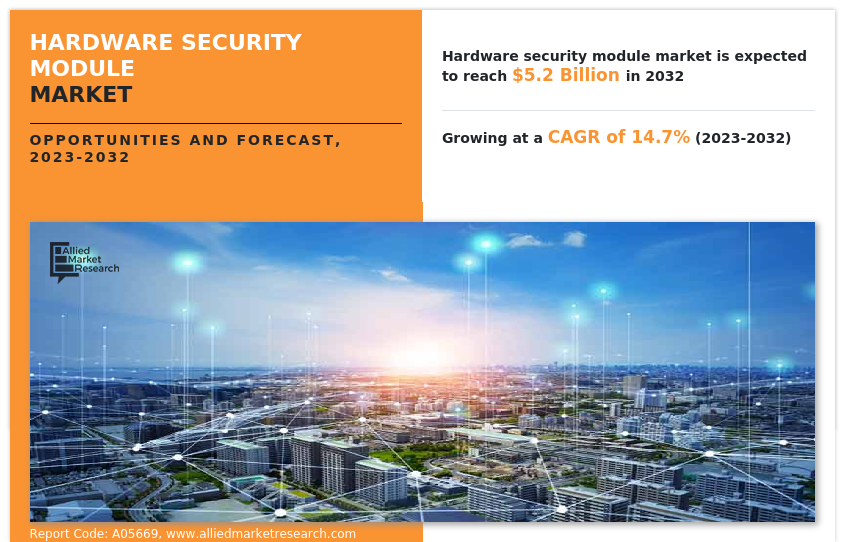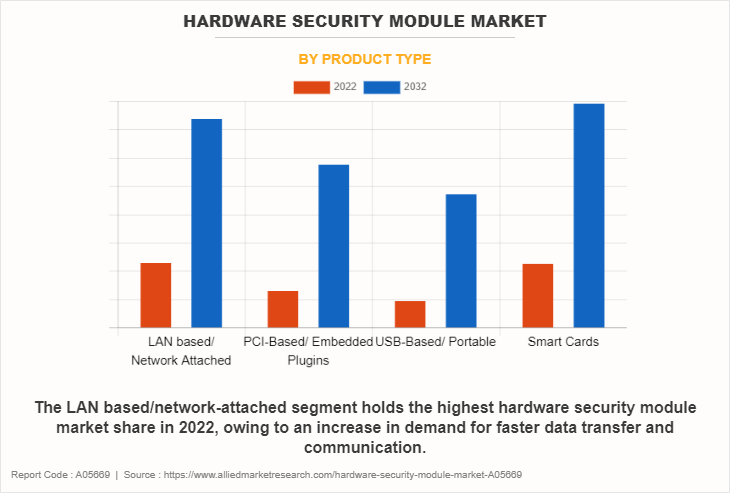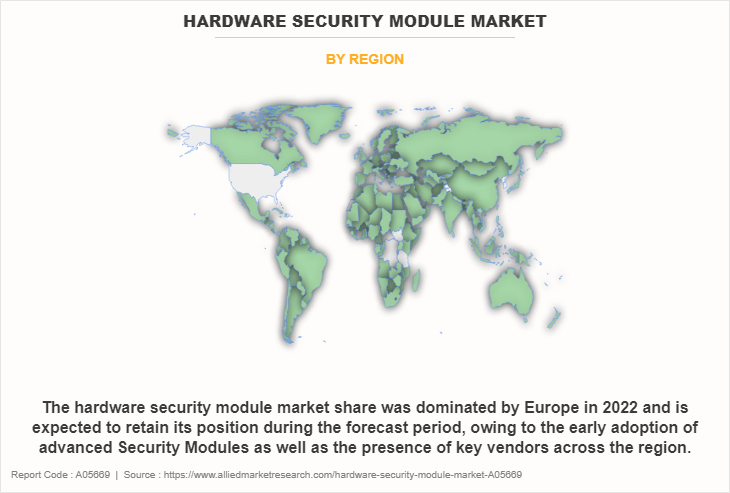Hardware Security Module Market Research, 2032
The global hardware security module market was valued at $1.3 billion in 2022, and is projected to reach $5.2 billion by 2032, growing at a CAGR of 14.7% from 2023 to 2032.
Hardware security models secure trade secrets that have significant value by ensuring only authorized individuals can access the hardware security module to complete a cryptography key transaction. The entire cryptography key lifecycle from provisioning, managing, and storing to disposing or archiving the keys occurs in the hardware security module. Digital signatures also may be captured via a hardware security module, and all access transactions are logged to create an audit trail. In general terms hardware security modules (HSMs) can be described as dedicated systems that physically as well as logically aid in securing cryptographic keys and cryptographic processing.

Increase in demand for digital banking solutions and surge in adoption of cloud-based solutions is boosting the growth of the global banking software market. in addition, increase in use of mobile banking the positively impacts growth of the banking software market. However, security issues and privacy concerns and high implementation cost is hampering the banking software market growth. On the contrary, increase in adoption of Artificial Intelligence based banking system is expected to offer remunerative opportunities for expansion of the banking software market during the forecast period.
Segment Review
The hardware security module market is segmented on the basis of type, deployment mode, application, industry vertical and region. On the basis of type, the market is categorized into LAN-based/ network attached, PCI-based/ embedded plugins, USB-based/ portable, and smart cards. On the basis of deployment mode, the market is fragmented into on-premise and cloud. On the basis of application, the market is bifurcated into payment processing, code and document signing, security sockets layer (SSL) and transport security layer (TSL), authentication, application-level encryption, and others. By industry vertical, it is classified into BFSI, IT & telecommunication, government, consumer goods & retail, transportation, aerospace & defense, and others. By region, the market is analyzed across North America, Europe, Asia-Pacific, and LAMEA.

In terms of product type, the LAN based/ network attached segment holds the highest hardware security module market share, owing to an increase in demand for faster data transfer and communication. However, the USB-based/ portable segment is expected to grow at the highest rate during the forecast period, owing to the growing need for strong data security.

Region wise, the hardware security module market size was dominated by Europe in 2022 and is expected to retain its position during the forecast period, owing to the early adoption of advanced Security Modules as well as the presence of key vendors across the region. However, Asia-Pacific is expected to witness significant growth during the forecast period, due to the growing penetration of technologies such as IoT, cloud, and so forth.
The key players that operate in the hardware security module market industry are Thales, utimaco GmbH., future, Adweb Technologies, IBM Corporation, Atos SE, Hewlett Packard Enterprise, Ultra-Electronics, Entrust Datacard, and Microchip Technology Inc. These players have adopted various strategies to increase their market penetration and strengthen their position in the hardware security module market industry.
Competition Analysis
Recent Partnerships in the Hardware Security Module Market
March 17, 2021: HPS partnered with Utimaco to offer state-of-the-art multi-channel payment as well as cyber security solutions to the financial sector. In addition, HPS has integrated Utimaco’s hardware security module Atalla AT1000 into PowerCARD, HPS’ comprehensive suite of solutions that covers the entire payment value chain.
Recent Product Launches in the Hardware Security Module Market
In October 11, 2021, Infineon, launched SLS37 V2X Hardware Security Module to safeguard vehicle to everything communication. Moreover, the discrete HSM helps system integrators to solve the conflicting requirements of high performance and high security. Therefore, the scope of the SLS37 V2X HSM is focused on high security tasks such as key storage and the generation of signatures for outgoing messages.
Recent Acquisition in the Hardware Security Module Market
On February 22, 2019, Entrust Datacard acquired nCipher general purpose hardware security module (GP HSM) division of Thales to offer trusted identity and secure transaction technologies. It has an ioTrust product designed for the deployment of secure PKI-based IoT ecosystems. The purchase of nCipher will expand its offerings to those companies who wish to secure IoT PKI keys locally and securely.
Top Impacting Factors
Increase in Data Breaches and Cyberattacks
Rise in the number of cyber threats is one of the major factors driving the growth of the market, owing to increase in ransom costs each year. Data security issues in enterprises raise the need for hardware security module programs. Today, enterprises are investing in this technology to keep a competitive edge in the market with safe and secure services. Furthermore, increase in the number of cyber threats is helping improve hardware security modules as these attacks help programs detect errors in the organization’s system. Therefore, these post-identification measures help organizations to prevent risk by identifying and analyzing the threats. Also, the software enables more features to secure the central system of the organization. Furthermore, identifying vulnerabilities helps organizations lessen the risks and revenue losses. In addition, the hardware security module helps organizations to timely update their program to comply with changing government security regulations. Therefore, the need for compliance with the regulation is leading to the adoption and demand for the hardware security module market industry.
Increase in Adoption of 5G Network
Increase in the adoption of 5G networks across the globe has created various opportunities for market players. Increased collaborations and expansions have resulted in the market growth. For instance, in 2022, Ericsson included the Thales hardware security module in its 5G Core authentication solution to reduce the rising vulnerability risks in the larger 5G ecosystem. Furthermore, increase in the number of IoT devices accelerates the demand for high-speed and low-latency connectivity that can support real-time data transfer and processing. This factor proliferates the considerable rise in advancement across the 5G technology market, with unusual focus on faster data transfer rates and lower latency, which in turn, drives the hardware security module market growth. Moreover, regional governments and private and public businesses are continuously involved in promoting digitalization in 5G operations and maintenance. For instance, in April 2023, Ericsson partnered with the Canada government, which was valued at more than $34.87 million (CAD 470 million). The alliance predominantly emphasized the development of next-generation communications technologies. Similarly, in February 2023, Nokia partnered with Kyndryl, to expand the edge computing development by delivering the LTE and 5G private wireless services and Industry 4.0 solutions to the customers. Such strategic investments pooling in the digitalizing of the 5G infrastructure will fuel the robust demand for 5G technology, which in turn, augments the market growth on a global scale. Such developments are expected to drive the hardware security module market growth.
Restraints
High Price related to Hardware Security Modules
Surge in costs can be attributed to a variety of factors, including increase in demand for robust data security, supply chain disruptions, and the incorporation of advanced features in modern HSMs. As organizations place greater emphasis on safeguarding their critical data and cryptographic keys, the cost of acquiring and implementing these specialized security devices rises. In this evolving landscape, businesses are evaluating the cost-benefit equation of HSMs, making price considerations a significant factor in the decision-making process for implementing these critical security measures is hampering the growth of the hardware security module market.
Opportunities
Growing Reliance on Cryptographic Keys
The growing reliance on cryptographic keys as a fundamental component of data security has spurred a heightened demand for effective key management solutions. The hardware security modules (HSM) market is witnessing a significant growth of hardware security module industry. With the proliferation of data, advent of cloud technologies, and escalating threat of cyberattacks, organizations are seeking robust key management solutions to ensure the integrity and confidentiality of their digital assets. HSMs, with their ability to securely generate, store, and manage cryptographic keys, have become essential tools in meeting this need. As a result, the HSM market is experiencing substantial growth as businesses recognize the vital role these devices play in safeguarding their cryptographic keys and, by extension, their data, which in turn is expected to provide lucrative opportunity for the growth of the hardware security module market.
Key Benefits For Stakeholders
- This report provides a quantitative analysis of the hardware security module market segments, current trends, estimations, and dynamics of the hardware security module market analysis from 2023 to 2032 to identify the prevailing hardware security module market opportunities.
- The hardware security module market outlook research is offered along with information related to key drivers, restraints, and opportunities.
- Porter's five forces analysis highlights the potency of buyers and suppliers to enable stakeholders make profit-oriented business decisions and strengthen their supplier-buyer network.
- In-depth analysis of the hardware security module market segmentation assists to determine the prevailing hardware security module market opportunity.
- Major countries in each region are mapped according to their revenue contribution to the global hardware security module market forecast.
- Market player positioning facilitates benchmarking and provides a clear understanding of the present position of the hardware security module vendors.
- The report includes the analysis of the regional as well as global hardware security module market trends, key players, hardware security module market segments, application areas, and hardware security module market growth strategies.
Hardware Security Module Market Report Highlights
| Aspects | Details |
| Market Size By 2032 | USD 5.2 billion |
| Growth Rate | CAGR of 14.7% |
| Forecast period | 2022 - 2032 |
| Report Pages | 270 |
| By Product Type |
|
| By Deployment Mode |
|
| By Application |
|
| By Industry Vertical |
|
| By Region |
|
| Key Market Players | Ultra Electronics Holdings Plc, Entrust Datacard, Hewlett Packard Enterprise, utimaco GmbH., Thales, Atos SE, IBM Corporation, Microchip Technology Inc., Adweb Technologies, Futurex |
Analyst Review
Hardware Security Module is a highly tamper-resistant device designed to protect and secure cryptographic devices and secure cryptoprocessor chips. It is also used to handle transparent database encryption keys for data privacy. To secure private and sensitive data from cyber-attacks, hacking, and data breaches. Moreover, Businesses can utilize hardware security modules to protect trade secrets that have substantial value by confirming that only authorized individuals can access the hardware security modules module to complete a cryptography key transaction.
The demand for hardware security modules is increasing among all industries, resulting in the growth of the market during the forecast period. With the growth in demand for hardware security module solutions, various companies have established acquisition strategies to increase their solutions offerings in AI solutions. For instance, in March 2021, FutureX, a global leader in hardened enterprise-class data security solutions announced that its payment HSM is integrated with jPOS to drive jPOS-based payment and expand their abilities. Further, such strategies drive market growth.
In addition, with the surge in demand for hardware security module, several companies have expanded their current product portfolio to continue with the rising demand in the market. For instance, in December 2019, Thales e-Security Inc. launched Safe Net Luna Network HSM version 7.4 with new features like a functionalist module, utilization metrics, and support for the ed25519ph curve variant.
For instance, in June 2023, Secure-IC partnered with NSITEXE to provide security solutions for Cyber-Physical Systems (CPS). it comes with a complete security lifecycle management for devices in the field.
There is a growing need for HSMs that can protect data and cryptographic keys against quantum threats. Quantum-safe HSMs will become more critical for securing sensitive information.
Payment Processing is the leading application of Hardware Security Module Market.
Europe is the largest regional market for Hardware Security Module,
$5,151.21 million by 2032 is the estimated industry size of Hardware Security Module.
Thales, utimaco GmbH., future, Adweb Technologies, IBM Corporation, Atos SE, Hewlett Packard Enterprise, Ultra-Electronics, Entrust Datacard, and Microchip Technology Inc are the top companies to hold the market share in Hardware Security Module.
Loading Table Of Content...
Loading Research Methodology...



